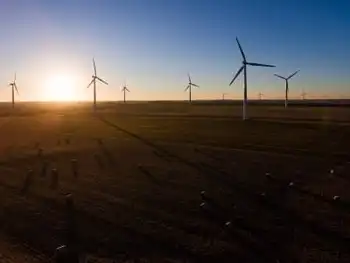Renewables to be excluded from budget cuts
By Associated Press
NFPA 70e Training - Arc Flash
Our customized live online or in‑person group training can be delivered to your staff at your location.

- Live Online
- 6 hours Instructor-led
- Group Training Available
"We're cutting past the bone. We're cutting bone marrow," Carroll, a Denver Democrat, said of the $1.5 billion gap in next fiscal year's $18 billion budget.
"Bone marrow is where the body gets immunity. You limit the body's ability to heal itself. But we have to go there."
As they begin their 120-day session, legislators will take a second look at the public schools budget, the state bureaucracy, and even tax credits that could help carry Colorado out of recession.
Gov. Bill Ritter has proposed a $260 million cut in funding for kindergarten through 12th-grade schools. He also wants to raise $312 million by charging sales tax on candy and soda and by eliminating or suspending a dozen tax breaks.
Senate President Brandon Shaffer, D-Longmont, said lawmakers could start by voting to rescind $110 million that they had set aside for schools. Lawmakers agreed last year to include the money for schools in the budget — but hold on to it to see how the economy, and state revenues fared after they adjourned.
Shaffer said he wants to find ways to increase jobs through retraining and requiring utilities to get more power from renewable energy. Right now, investor-owned utilities must obtain 20 percent of their power from renewable sources by 2020.
"The road out of this is an economic recovery and an economic recovery starts with a good job," he said.
Senate Minority Leader Josh Penry, R-Fruita, is introducing a bill to combine state agencies and offer financial incentives to school districts to cut costs. His bill would abolish the position of executive director of the Department of Local Affairs and give those responsibilities to the lieutenant governor, whose only real duty is overseeing Indian affairs.
"We cannot get our fiscal house in order without getting rid of the redundancy and excess in state government. This bill will do just that," Penry said.
Ritter told lawmakers he wants to eliminate 13 tax breaks and credits to balance this year's budget. Some lawmakers say there are 87 other tax breaks that can be considered, including conservation tax easements.
Under a plan Ritter submitted to legislators, some business-specific tax breaks would be eliminated or suspended, including a sales tax exemption on agricultural compounds and bull semen, worth $1.5 million a year.
Ritter's call to limit conservation easement credits for three years would raise $13 million annually.
House Minority Leader Mike May, R-Parker, said it makes no sense to offer tax breaks to farmers and ranchers not to build on their property because few people can afford to spend money on development in the current economy.
Environmentalists say the tax credit is one of the only meaningful tools available in Colorado to promote private land conservation and reduce the impact of population growth on habitat and species.
Ritter also plans to make promotion of renewable energy a key issue again this year. Environmentalists say that will help the economy.
"This session is about improving the lives of people across Colorado. Strengthening our renewable electricity standard is exactly what we need to create jobs in these tough economic times," said Pam Kiely of Environment Colorado.











